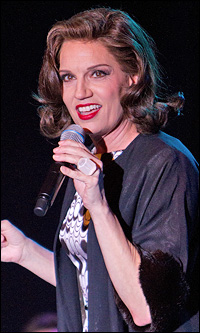
*
Sheldon Epps, artistic director of the Pasadena Playhouse, has made a couple of forays to this coast with musicals original in content but familiar in score.
Blues in the Night reprised a catalog of established musical laments in a seedy Chicago hotel of 1938, assigning them to three women (Jean Du Shon, Debbie Shapiro and Leslie Uggams) in love with the same man (Charles Coleman). It wound up in the Tony running for 1982's Best Musical. In 1997, it was Epps' idea to transplant Shakespeare's Twelfth Night in the kingdom of Harlem, a-swing with the songs of Duke Ellington. It won Tony nominations for two of its performers, Tonya Pinkins and Andre De Shields, and its orchestrator, Luther Henderson.
Well, Epps is back on Broadway with Baby It's You!, another spin of the evergreens, these from the '60s pop and doo-wop singles of Scepter Records, the label founded by Florence Greenberg — timeless ditties like "Louie Louie," "Twist and Shout," "It's My Party."
How a middle-aged Jewish woman changed the sounds and fates of black recording artists is relayed in a musical book by Floyd Mutrux (who co-directed the show with Epps) and Colin Escott, two men whose replay of '50s rock 'n' roll continues to play on at the Nederlander Theatre from last season, Million Dollar Quartet. Here's what Epps had to say about the '60s-set musical — centered on Greenberg and The Shirelles — opening April 27 at the Broadhurst.
How did you get involved with Baby It's You!?
Sheldon Epps: We were at the end of the 2009 season at Pasadena Playhouse, and we had a show drop out — suddenly. I'd heard several good things about a smaller workshop production of this show that was at the Coast Playhouse in West Hollywood. I did a little reading about the subject matter — about The Shirelles and Florence Greenberg and all of that — and went over to see it. I was very taken with it and very taken with the idea of developing it for a larger venue, so we were able to make an arrangement to make it the last show of our season.
This show qualifies as an original musical, but you already know the songs when you go into the theatre. You've done that before, though, haven't you?
SE: Yeah. I've done that with Play On! with Duke Ellington songs and Blues in the Night. That's certainly something that I do.
 |
||
| Beth Leavel performs at a press event. |
||
| photo by Krissie Fullerton |
SE: Well, one thing you know is that you're going to get a very pleasing score because the songs are so great. The other thing is that I find with music like this — especially pop music — that these are really the songs of people's lives, the songs that they dated to and fell in love to and met their husbands to and all of that, so they strike a very particular emotional chord in people. As soon as people hear a song like "Soldier Boy" or "Dedicated to the One I Love," it takes them right back to the period.
Are you hewing a biographical line for a story?
SE: Absolutely. That was really one of the things that fascinated me about the show. Of course, it's full of all this great music — primarily, The Shirelles music — but, in fact, the storyline is really much more about the woman who discovered The Shirelles and who started Scepter Records — this woman named Florence Greenberg who, around the age of 40, just decided that she wanted a fuller, more rewarding life and wanted to follow this dream she had and left New Jersey to work with black entertainers.
This is a rather unexpected direction for a Jewish matron to go, isn't it?
SE: What we learned is that she just loved to keep the radio on all day, and this was the music that she listened to, that she responded to. Once she'd made that decision, her daughter actually took her to her high school to hear these four girls, who she thought was terrific. Florence had a great ear for the popular American sound, what would work.
Are there only Shirelles hits in the show?
SE: No. Later in her career, she worked with Dionne Warwick and Burt Bacharach, so later on there are some songs by them. We have some Isley Brothers songs, some Chuck Jackson songs. Lesley Gore was on Scepter Records.
Also "Louie Louie" and "Twist and Shout" — how many songs do you have? SE: Oh, God, I think there's something like 40 songs in the show — but we don't necessarily do all of some songs.
That doesn't leave you a lot of time for a story, does it?
SE: That's the challenge — to get in the information that you need about Florence and her life and her family and her relationship with the girls and being a woman ahead of her time.
Can you speak a little bit about the contributions of Colin Escott and Floyd Mutrux?
SE: This was really Floyd's idea. He was the one who knew about Florence Greenberg, and he worked with Colin before on Million Dollar Quartet, and their whole esthetic philosophy about these shows is to find these interesting characters or incidents behind the lives of the people that we've heard a lot about and to use the well-known music that the people created to explore that incident or somebody behind the scenes in their lives.


Matthew-Murphy.jpg)







